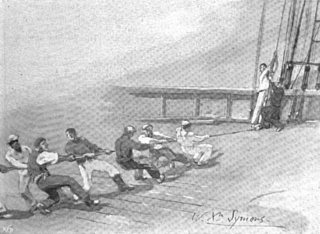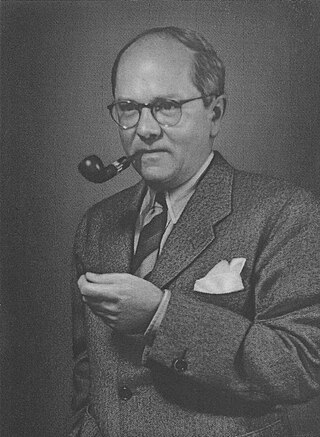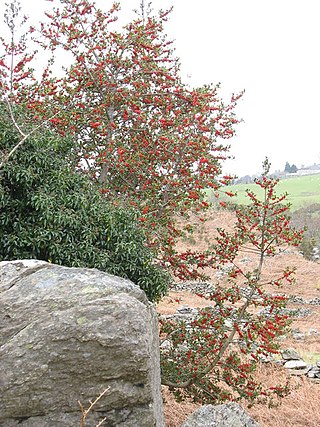
Music hall is a type of British theatrical entertainment that was popular from the early Victorian era, beginning around 1850. It faded away after 1918 as the halls rebranded their entertainment as variety. Perceptions of a distinction in Britain between bold and scandalous Music Hall and subsequent, more respectable Variety differ. Music hall involved a mixture of popular songs, comedy, speciality acts, and variety entertainment. The term is derived from a type of theatre or venue in which such entertainment took place. In North America vaudeville was in some ways analogous to British music hall, featuring rousing songs and comic acts.

A sea shanty, chantey, or chanty is a genre of traditional folk song that was once commonly sung as a work song to accompany rhythmical labor aboard large merchant sailing vessels. The term shanty most accurately refers to a specific style of work song belonging to this historical repertoire. However, in recent, popular usage, the scope of its definition is sometimes expanded to admit a wider range of repertoire and characteristics, or to refer to a "maritime work song" in general.

"John Brown's Body" is a United States marching song about the abolitionist John Brown. The song was popular in the Union during the American Civil War. The tune arose out of the folk hymn tradition of the American camp meeting movement of the late 18th and early 19th century. According to an 1889 account, the original John Brown lyrics were a collective effort by a group of Union soldiers who were referring both to the famous John Brown and also, humorously, to a Sergeant John Brown of their own battalion. Various other authors have published additional verses or claimed credit for originating the John Brown lyrics and tune.

The "Battle Hymn of the Republic", also known as "Mine Eyes Have Seen the Glory" or "Glory, Glory Hallelujah" outside of the United States, is a popular American patriotic song written by the abolitionist writer Julia Ward Howe.

A football chant or terrace chant is form of vocalisation performed by supporters of association football, typically during football matches. Football chanting is an expression of collective identity, most often used by fans to express their pride in the team or encourage the home team, and they may be sung to celebrate a particular player or manager. Fans may also use football chants to slight the opposition, and many fans sing songs about their club rivals, even when they are not playing them. Sometimes the chants are spontaneous reactions to events on the pitch.

"Auld Lang Syne" is a popular song, particularly in the English-speaking world. Traditionally, it is sung to bid farewell to the old year at the stroke of midnight on New Year's Eve. By extension, it is also often heard at funerals, graduations, and as a farewell or ending to other occasions; for instance, many branches of the Scouting movement use it to close jamborees and other functions.

Richard Armstrong Whiting was an American composer of popular songs, including the standards "Hooray for Hollywood", "Ain't We Got Fun?" and "On the Good Ship Lollipop". He also wrote lyrics occasionally, and film scores most notably for the standard "She's Funny That Way".

"It's a Long Way to Tipperary" is an Irish music hall song first performed in 1912 by Jack Judge, and written by Judge and Harry Williams, though authorship of the song has long been disputed.

"When Johnny Comes Marching Home", sometimes "When Johnny Comes Marching Home Again", is a popular song from the American Civil War that expressed people's longing for the return of their friends and relatives who were fighting in the war.
"The Army Goes Rolling Along" is the official song of the United States Army and is typically called "The Army Song". It is adapted from an earlier work titled the "U.S. Field Artillery March".

"The Holly and the Ivy" is a traditional British folk Christmas carol, listed as number 514 in the Roud Folk Song Index. The song can be traced only as far as the early nineteenth century, but the lyrics reflect an association between holly and Christmas dating at least as far as medieval times. The lyrics and melody varied significantly in traditional communities, but the song has since become standardised. The version which is now popular was collected in 1909 by the English folk song collector Cecil Sharp in the market town of Chipping Campden in Gloucestershire, England, from a woman named Mary Clayton.
"Drunken Sailor", also known as "What Shall We Do with a/the Drunken Sailor?" or "Up She Rises", is a traditional sea shanty, listed as No. 322 in the Roud Folk Song Index. It was sung onboard sailing ships at least as early as the 1830s, and it shares its tune with the traditional Irish folk song "Óró sé do bheatha abhaile".
"Streets of Laredo", also known as "The Dying Cowboy", is a famous American cowboy ballad in which a dying ranger tells his story to another cowboy. Members of the Western Writers of America chose it as one of the Top 100 Western songs of all time.
"Oh Shenandoah" is a traditional folk song, sung in the Americas, of uncertain origin, dating to the early 19th century.
Dives and Lazarus is traditional English folk song listed as Child ballad 56 and number 477 in the Roud Folk Song Index. It is considered a Christmas carol and based on the parable of the rich man and Lazarus. The song traditionally used a variety of tunes, but one particular tune, published by Lucy Broadwood in 1893 and used in other traditional songs, inspired many notable works and appeared in several pieces composed by Ralph Vaughan Williams.
"Keep Your Eyes on the Prize" is a folk song that became influential during the American Civil Rights Movement of the 1950s and 1960s. It is based on the traditional song, "Gospel Plow," also known as "Hold On," "Keep Your Hand on the Plow," and various permutations thereof.
The "Marines' Hymn" is the official hymn of the United States Marine Corps, introduced by the first director of the USMC Band, Francesco Maria Scala. Its music originates from an 1867 work by Jacques Offenbach with the lyrics added by an anonymous author at an unknown time in the following years. Authorized by the Commandant of the Marine Corps in 1929, it is the oldest official song in the United States Armed Forces. The "Marines' Hymn" is typically sung at the position of attention as a gesture of respect. However, the third verse is also used as a toast during formal events, such as the birthday ball and other ceremonies.

George Arthurs was an English songwriter, playwright, composer, author and screenwriter who contributed lyrics to several successful musical comedies such as The Belle of Mayfair (1906), Havana (1908) and Yes, Uncle! (1917), before writing dialogue for such films as The Yellow Mask (1931).
The Gloucestershire Wassail, also known as "Wassail! Wassail! All Over the Town", "The Wassailing Bowl" and "Wassail Song" is an English Christmas carol from the county of Gloucestershire in England, dating back to at least the 18th century, but may be older.









